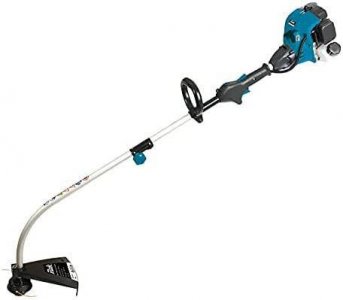Whipper Snipper or Brush Cutter – What do you call it?
It’s not every day that people debate a garden tool. But recently, Aussies tried to identify an image shared by one poster on the social news website Reddit. See the photo below:
The post's author asked members of the Australia forum: ‘Settle a debate for me. Is this a Whipper Snipper or a Brush Cutter?’
Reddit users did not hesitate to chime in.
A top comment humorously said: ‘Model number is “maybemightstart2000”. Comes with line, oil, and ibuprofen for the headache it might give you.’
Another stated: ‘Whipper snipper. Brush cutters have solid blades. I don't think they usually have that bend in the shaft either.’
One Redditor posted, albeit unsure: ‘Whipper Snipper. Line trimmer at a stretch. Brush cutter would need to be more robust, I reckon.’
‘I define it this way too. If you're using it in someone's yard, it's a whipper snipper. If you're using it in the bush, it's a brush cutter,’ replied one user.
The answers leaned overwhelmingly toward whipper snipper, and some answers tried to explain what makes it distinct from a brush cutter.
Among the most detailed answers on the thread was the following response: ‘A whipper snipper has a bent frame, tapper head for feeding cord, handle based throttle control with a D ring handle, and are lower power units. These are residential units designed for occasional use.’
They continued: ‘Brush cutters are straight-frame, use a bullhorn handle, and need a harness. They use a fixed head that the cord needs to be manually pulled from because they use a thicker gauge cord that can’t fit in a tapper. They’re more powerful units and pretty much exclusively business-oriented, designed for long-term, constant use.’
And they are right. Another notable difference is that whipper snippers generally use nylon while brush cutters have metal blades. The former is meant to cut overgrowth, such as weed. They are generally lightweight and easy to use in tight spaces. Meanwhile, brush cutters are preferred in cutting through thicker vegetation, including tree branches. As such, the tools are typically more expensive and require more maintenance.
Redditors also brought up that ‘whipper snipper’ is a term mostly used Down Under and other countries have different names for the popular tool.
One said: ‘We say whipper snipper, Americans say line trimmer.’
Another chimed in: ‘In the UK, they say strimmer – short for a string trimmer. NZ say weed eater. It’s a Frisbee thing.’ Others shared that ‘whupper snupper’ and ‘weed whacker’ are also used by our Kiwi neighbours.
According to the Wikipedia entry for string trimmers, Canadians also call the tools whipper snippers. However, the British, Irish, and South Africans refer to them as brush cutters – is this the source of the confusion?
But Whipper Snipper is actually a brand name. ‘It is a trademark for Black and Decker, so it's like calling every vacuum cleaner a Hoover,’ an Aussie shared.
The term was registered in 1977 by the international manufacturer of power tools and is due to be renewed by 2028 (not too long to go from today!). Trademark Elite notes, however, the company has not been granted the exclusive use of ‘snipper’.
A Redditor identified the item's brand: ‘It appears to have a changeable head. Is that Makita? This may be a whipper snipper AND a brush cutter. Just don’t call it a weed whacker!’
Doing a Google Reverse Image search reveals that the product is, in fact, manufactured by Makita. It is listed in various marketplaces, with the terms ‘line trimmer’, ‘string trimmer’, and ‘brush cutter’ used to describe it depending on location.
The tool appears to have a nylon cutting head, which makes it more likely to be a string trimmer. And while it would be what we call a ‘whipper snipper’ here, the term might not be the most accurate – technically, it is not branded ‘Whipper Snipper’ or manufactured by Black & Decker. Makita is another known producer of power tools based in Japan and is, in fact, a rival brand.
So, yes, it is a ‘whipper snipper’, but it is not a Whipper Snipper. Further, it is a string trimmer AND a brush cutter, but only if you are from the UK, Ireland, or South Africa!
What do you think, folks? What do you call it? Let us know in the comments!
The post's author asked members of the Australia forum: ‘Settle a debate for me. Is this a Whipper Snipper or a Brush Cutter?’
Reddit users did not hesitate to chime in.
A top comment humorously said: ‘Model number is “maybemightstart2000”. Comes with line, oil, and ibuprofen for the headache it might give you.’
Another stated: ‘Whipper snipper. Brush cutters have solid blades. I don't think they usually have that bend in the shaft either.’
One Redditor posted, albeit unsure: ‘Whipper Snipper. Line trimmer at a stretch. Brush cutter would need to be more robust, I reckon.’
‘I define it this way too. If you're using it in someone's yard, it's a whipper snipper. If you're using it in the bush, it's a brush cutter,’ replied one user.
The answers leaned overwhelmingly toward whipper snipper, and some answers tried to explain what makes it distinct from a brush cutter.
Among the most detailed answers on the thread was the following response: ‘A whipper snipper has a bent frame, tapper head for feeding cord, handle based throttle control with a D ring handle, and are lower power units. These are residential units designed for occasional use.’
They continued: ‘Brush cutters are straight-frame, use a bullhorn handle, and need a harness. They use a fixed head that the cord needs to be manually pulled from because they use a thicker gauge cord that can’t fit in a tapper. They’re more powerful units and pretty much exclusively business-oriented, designed for long-term, constant use.’
And they are right. Another notable difference is that whipper snippers generally use nylon while brush cutters have metal blades. The former is meant to cut overgrowth, such as weed. They are generally lightweight and easy to use in tight spaces. Meanwhile, brush cutters are preferred in cutting through thicker vegetation, including tree branches. As such, the tools are typically more expensive and require more maintenance.
Redditors also brought up that ‘whipper snipper’ is a term mostly used Down Under and other countries have different names for the popular tool.
One said: ‘We say whipper snipper, Americans say line trimmer.’
Another chimed in: ‘In the UK, they say strimmer – short for a string trimmer. NZ say weed eater. It’s a Frisbee thing.’ Others shared that ‘whupper snupper’ and ‘weed whacker’ are also used by our Kiwi neighbours.
According to the Wikipedia entry for string trimmers, Canadians also call the tools whipper snippers. However, the British, Irish, and South Africans refer to them as brush cutters – is this the source of the confusion?
But Whipper Snipper is actually a brand name. ‘It is a trademark for Black and Decker, so it's like calling every vacuum cleaner a Hoover,’ an Aussie shared.
The term was registered in 1977 by the international manufacturer of power tools and is due to be renewed by 2028 (not too long to go from today!). Trademark Elite notes, however, the company has not been granted the exclusive use of ‘snipper’.
A Redditor identified the item's brand: ‘It appears to have a changeable head. Is that Makita? This may be a whipper snipper AND a brush cutter. Just don’t call it a weed whacker!’
Doing a Google Reverse Image search reveals that the product is, in fact, manufactured by Makita. It is listed in various marketplaces, with the terms ‘line trimmer’, ‘string trimmer’, and ‘brush cutter’ used to describe it depending on location.
The tool appears to have a nylon cutting head, which makes it more likely to be a string trimmer. And while it would be what we call a ‘whipper snipper’ here, the term might not be the most accurate – technically, it is not branded ‘Whipper Snipper’ or manufactured by Black & Decker. Makita is another known producer of power tools based in Japan and is, in fact, a rival brand.
So, yes, it is a ‘whipper snipper’, but it is not a Whipper Snipper. Further, it is a string trimmer AND a brush cutter, but only if you are from the UK, Ireland, or South Africa!
What do you think, folks? What do you call it? Let us know in the comments!








